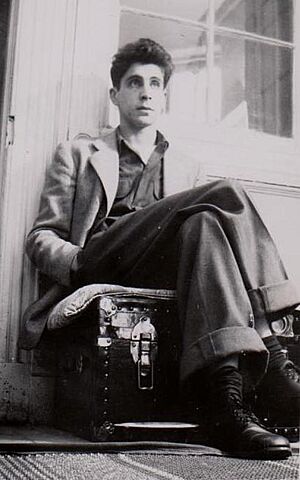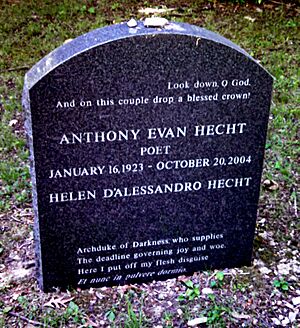Anthony Hecht facts for kids
Quick facts for kids
Anthony Hecht
|
|
|---|---|
 |
|
| Born | Anthony Evan Hecht January 16, 1923 New York City, New York, U.S. |
| Died | October 20, 2004 (aged 81) Washington, D.C., U.S. |
| Occupation | Poet |
| Education | Bard College Kenyon College (BA) Columbia University (MA) University of Iowa |
| Notable awards | Guggenheim Fellowship (1954) Rome Prize (1952) Bollingen Prize (1983) National Medal of Arts (2004) Pulitzer Prize for Poetry (1968) Robert Frost Medal (2000) |
Anthony Evan Hecht (born January 16, 1923 – died October 20, 2004) was an American poet. He wrote poems that were very well-structured and often explored tough topics. These included the difficult events of the 20th century. He especially focused on World War II, where he served, and the Holocaust.
Contents
Anthony Hecht's Life Story
Growing Up and Early Years
Anthony Hecht was born in New York City. His parents were Jewish and came from Germany. He went to several schools in the city. One of his classmates at Horace Mann School was Jack Kerouac, who later became a famous writer. Anthony didn't seem to be a great student at first.
However, when he was a freshman at Bard College in New York, he found a love for poetry. He discovered the works of poets like Wallace Stevens, W. H. Auden, T. S. Eliot, and Dylan Thomas. It was then that he decided he wanted to be a poet. His parents were not happy with this plan. They even asked their friend, Ted Geisel (who you might know as Dr. Seuss), to try and change his mind.
In 1944, after finishing his last year at Bard, Hecht joined the army. He was sent to fight in Europe with the 97th Infantry Division. He fought in battles in Germany and Czechoslovakia.
A very important event happened on April 23, 1945. Hecht's army division helped free people from the Flossenbürg concentration camp. Hecht was told to talk to French prisoners there. His job was to gather information about the camp's leaders. Years later, Hecht said that the suffering he saw was "beyond comprehension." He added that for years afterward, he would "wake shrieking." This experience deeply affected him.
His Career as a Poet and Teacher
After the war, Hecht was sent to Japan. He worked as a writer for the Stars and Stripes newspaper. He came back to the U.S. in March 1946. He used the G.I. Bill to study poetry with John Crowe Ransom at Kenyon College in Ohio. There, he met other poets like Randall Jarrell and Elizabeth Bishop. He later earned his master's degree from Columbia University.
In 1947, Hecht went to the University of Iowa. He taught at the Iowa Writers' Workshop. He had served in World War II with another writer, Robie Macauley. After his war service, Hecht struggled with his mental health. He soon left teaching to get help for his mind.
In the spring of 1947, he taught at Kenyon College. His first poems, "Once Removed" and "To a Soldier Killed in Germany," were printed in The Kenyon Review. Later that year, he had a difficult time and returned to his parents' home in New York City. He began getting professional help. In 1948, his poems started appearing in other magazines like The Hudson Review and Poetry. He later won the Furioso Poetry Award. He then went to Columbia University to study English literature.
Hecht published his first collection of poems, A Summoning of Stones, in 1954. Even then, people often compared his poetry to that of W. H. Auden. Hecht and Auden became friends in 1951. In 1993, Hecht published The Hidden Law, a book about Auden's work.
In his second book, The Hard Hours, Hecht wrote about his experiences in World War II. These memories had caused him to struggle with his mental health again in 1959. Hecht spent three months in the hospital.
Hecht mainly earned his living by teaching poetry. He taught at the University of Rochester from 1967 to 1985. He also taught for different periods at other famous schools. These included Smith, Bard, Harvard, Georgetown, and Yale. From 1982 to 1984, he held the important job of Poet Laureate Consultant in Poetry to the Library of Congress.
Anthony Hecht won many awards for his poetry. These included the 1968 Pulitzer Prize for Poetry for The Hard Hours. He also received the 1983 Bollingen Prize and the 2000 Robert Frost Medal.
Hecht passed away on October 20, 2004, at his home in Washington, D.C. He is buried at the cemetery at Bard College. One month later, on November 17, Hecht was given the National Medal of Arts. His wife, Helen Hecht, accepted it for him.
The Anthony Hecht Poetry Prize is now given out every year by the Waywiser Press.
Hecht's Writing Style and Themes
Hecht was known for being a master of traditional poetry forms. He was also very good at controlling language. He was extremely knowledgeable, and his poems often included references to French literature, Greek myths, and English poets. People often called him a "traditionalist" because of his style. In The Hard Hours (1967), Hecht wrote about his time as a soldier in Europe during World War II.

Images for kids
 | Claudette Colvin |
 | Myrlie Evers-Williams |
 | Alberta Odell Jones |


